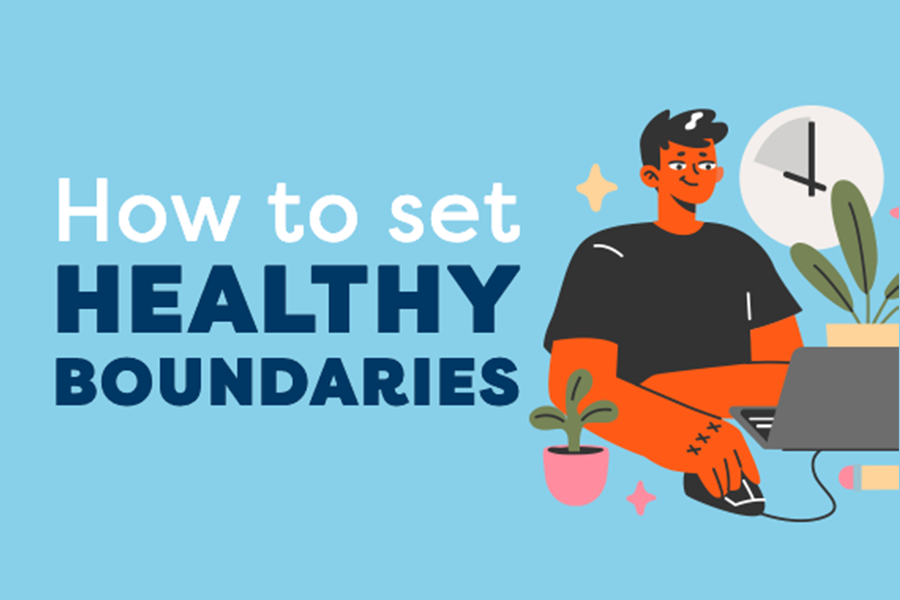
CMU=You Wellbeing Series: Healthy Boundaries
Want more wellbeing tips like the article below? Access CMU=You today and go to the Wellness tile for the Wellbeing Center and other wellness resources.
Humans need social connections. It’s how we thrive. However, navigating different relationships in our lives also means having to deal with commitments and the expectations of others. We want to nurture our connection with friends, family, partners and colleagues, so it’s easy to become overwhelmed and neglect your own limits sometimes. Unfortunately, setting boundaries often gets confused with ‘being selfish’.
This could not be further from the truth. Psychology Today defines boundaries as "limits we set with people to indicate what we find acceptable and unacceptable in their behavior towards us." Not only is setting healthy boundaries absolutely essential for our well-being, it is also the only way long-term relationships can stay successful, whether that’s in our professional or personal lives. The good news is that setting healthy boundaries is something you can learn. And we’re here to show you how!
Ten Essential Tips to Help You Master the Art of Setting Healthy Boundaries
- Know why you’re setting boundaries.
One of the first things you should do is really think about who you are as a person. What are your values, needs and limits? Two different people may have very different limits and what one person will see as crossing a boundary, another might not even notice. If you want to feel confident about setting boundaries, it’s important to know why they’re important to you. For example, if you know that too much social interaction will affect your mood because you feel overstimulated, you know why it’s important to make sure your calendar is not packed with events. - Communicate in an honest and open way.
Communication is key, that’s no different when it comes to establishing boundaries. By expressing your needs and limits to others from the beginning you avoid setting expectations that you won’t be able to meet. In a respectful way, just communicate how you feel. - Don’t be afraid of the word "no."
Do you ever feel like you need to come up with an excuse to get out of something because you think simply saying you don’t feel like doing it is not good enough? We’ve all been there. This is where the most valuable lesson for boundary setting comes in: "No" is a full sentence. It’s okay to say no to commitments or invitations simply because they don’t align with your wellbeing priorities right now. You don’t need to explain or justify that decision. - Be serious about self-care.
Do things that give you energy or make you happy and be unapologetic about that. If you want to spend your Saturday reading, going for a walk and taking a long bath, do it! Time that we spend by ourselves is sometimes seen as time that you’re actually free to do something else, but these activities are just as important as other commitments. - Trust your gut.
If you’re in a social situation where you feel stressed, overwhelmed or uncomfortable, trust your instincts. If you feel like your boundaries are being ignored, don’t neglect those warning signs because you don’t want to upset anyone or you’re afraid you’re overreacting. - Be consistent about your boundaries.
Once you’ve established boundaries, make sure you stick to them across different situations with different people. Being consistent shows that these boundaries are non-negotiable and that, for example, your "no" won’t turn into a "yes" if they keep asking. - Start small.
Setting boundaries can seem scary in the beginning, especially when you’re used to ignoring your own limits to please others. So don’t put too much pressure on yourself to immediately get it right in every single situation. Start with smaller challenges to see how it feels and gain more confidence. - Get support from someone you trust.
Establishing and upholding boundaries is a process. If the thought of having to do it alone is too overwhelming, get a friend, family member or therapist involved. You can communicate with them what you’re trying to achieve and what you find the most challenging and they can offer encouragement, insight and a fresh perspective. - Keep your boundaries dynamic.
As you grow and change throughout your life, so will your boundaries. It might be that your limits change, which is absolutely fine. Stay open to reassessing and modifying your boundaries whenever you feel like it. - Respect other people’s boundaries.
It goes without saying that other people will have limits and boundaries as well. In order to maintain healthy and respectful connections, boundaries need to be respected both ways. Remember that everyone’s boundaries are different, so even when you don’t understand why someone has a specific limit, that doesn’t make it less valid and important.
Setting healthy boundaries is not selfish, it’s respecting yourself. Even if it feels like you’re disappointing others or not everyone understands, communicating your boundaries will eventually improve the relationships you have with people.